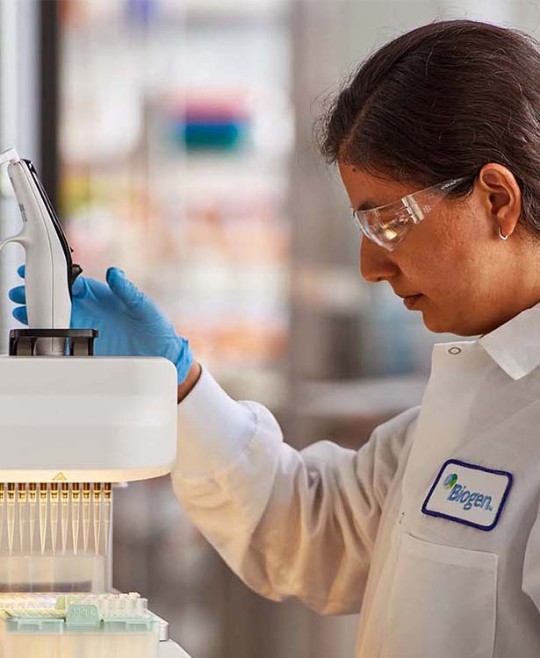Disease Areas
Amyotrophic Lateral Sclerosis

Amyotrophic Lateral Sclerosis (ALS)
ALS is a progressive neurodegenerative disease that robs people of the ability to move and leads them to lose their ability to speak — and eventually breathe.
Our Approach
For over a decade, Biogen has been committed to advancing ALS research to provide a deeper understanding of all forms of this devastating disease, which currently impacts an estimated 352,000 people worldwide.
Innovative Research
By leveraging established scientific capabilities and embarking on strong R&D collaborations, we’re determined to follow the science to advance a comprehensive, multi-modality ALS portfolio that fosters our long-term leadership in this space.
Stories
Kate’s Story
Kate was busy planning her wedding when she was diagnosed with amyotrophic lateral sclerosis (ALS), one week before her 33rd birthday. With their plans for the future turned upside down, she and her husband are trying to make their lives feel as normal as possible, as she focuses on her new purpose: being an advocate for ALS.
Mechanism of Disease: ALS
Amyotrophic lateral sclerosis (ALS) is a fatal, adult-onset neurodegenerative disorder. Symptoms include progressive muscle weakness, paralysis and respiratory complications. Learn more about how the disease progresses in adults.
Clinical Trials
Biogen conducts clinical trials in ALS related to the investigational therapies in our pipeline to evaluate the efficacy and safety of potential medicines.
View all recruiting Biogen clinical trials in ALS
Deciding to participate in a clinical trial requires careful consideration. In most cases, the therapies investigated in clinical trials are not yet approved by regulatory agencies like the U.S. Food and Drug Administration (FDA). The benefits and risks of taking the treatment are not completely known. By volunteering for a clinical trial, you are helping the medical community determine whether new treatments are safe and effective.
Learn more about clinical trials and access programs
Facts and Figures
352k
ALS impacts approximately 352,000 people worldwide. 1, 2
3–5y
Average life expectancy for people with ALS is three to five years from the time of symptom onset.3
2%
Two percent of ALS cases are caused by mutations in the SOD1 gene. Life expectancy in SOD1-ALS varies widely, with some patients surviving less than a year. 4
Xu 2020. Reference: Xu L, Liu T, Liu L, Yao X, Chen L, Fan D, Zhan S, Wang S. Global variation in prevalence and incidence of amyotrophic lateral sclerosis: a systematic review and meta-analysis. J Neurol. 2020 Apr;267(4):944-953
United Nations, World population prospects: The 2010 revision (2022). New York.
Brown RH, Al-Chalabi A. Amyotrophic Lateral Sclerosis. N Engl J Med. 2017 Jul 13
Brown CA, Lally C, Kupelian V, Flanders WD. Estimated Prevalence and Incidence of Amyotrophic Lateral Sclerosis and SOD1 and C9orf72 Genetic Variants. Neuroepidemiology. 2021


